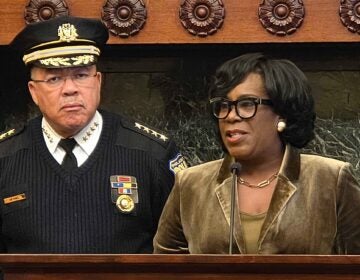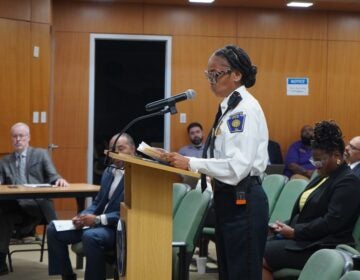New Penn policing program for senior officers will help bring change to Philadelphia police, commissioner says
The move from a “paramilitary mindset” to a more service-oriented model is the goal of a five-year strategic plan, Commissioner Kevin Bethel said.

Flags fly at the University of Pennsylvania’s athletic stadium and sports medicine center. (Kimberly Paynter/WHYY)
From Philly and the Pa. suburbs to South Jersey and Delaware, what would you like WHYY News to cover? Let us know!
Change is coming to the Philadelphia Police Department.
Next year, Police Commissioner Kevin Bethel will launch a five-year strategic plan for the 5,000-plus-member police department.
The goal? Bethel wants to transform the department from a “paramilitary mindset” and move toward more of a service business model.
That paramilitary culture has been a part of departments in the U.S. for many years.
“It is a great model to be able to move men and women, but it also retards thinking outside of the box,” Bethel said.
To that end, the University of Pennsylvania will launch a new course that should help that process along, he said. Fifteen select members of the department’s senior leadership will be able to earn a master’s degree in criminology, tuition free. They will be followed by 30 officers in two additional cohorts.
The program was made possible by a $2.55 million grant from the Neubauer Family Foundation. The officers were chosen by a panel of senior leaders. Each had to submit their résumé and write an essay explaining why they wanted to participate.
“Part of the training is set up around criminology and police leadership,” Bethel said. “The men and women of the department are getting very good at being data-focused and using data to drive decision-making and deployment.”
The next step is developing them as leaders, he said.
“I think the goal of a program like this is to enhance their ability to think critically, to be able to use the research and apply it effectively,” Bethel said, “and how do you use it in the service of your community.”
He said he was grateful for the Neubauer Family Foundation and Penn for creating the course.
The Master of Applied Criminology and Police Leadership, or MCPL, degree was designed by the faculty of the University of Pennsylvania’s Criminology Department. It is open to senior police leadership nationwide.
“Recognizing the absence of a focused graduate education program for senior policing personnel in the U.S., we believe this first-of-its-kind MCPL program will equip executives with the advanced tools needed to address critical challenges in public safety, recruitment, retention and public trust,” Joe Neubauer said in a statement. “This initiative aligns perfectly with our commitment to Philadelphia and to fostering excellence in public service.”
A national survey by the Police Executive Research Forum reported that, in 2022, 71% of law enforcement agencies spent less than 5% of their budgets on new recruit training. The survey also found that even less money was spent on training for senior police leaders.
“I think it’s a good program for senior officers who want to further their education,” said Crystal Williams-Coleman, president of the Guardian Civic League in Philadelphia, who served for 32 years as a city police officer before retiring.
In addition to improving police department leadership, Williams-Coleman said promoting the program to the public could also improve community relations and help recruitment and retention, which are also goals of the Guardian Civic League.
Already, five senior officers in the department have participated in the Policing Leadership Academy in Chicago, which takes commanders from some of the most violent districts in the U.S. and instructs them on innovative strategies and techniques to reduce violence.
One of them is Capt. Joseph Green of the 12th Police District in Southwest Philadelphia. After completing the course, he created a capstone project to encourage his officers to step up their community engagement.
After one year and 14,000 community engagements, such as visits to schools and business and getting to know neighbors, the district saw significant decreases in homicides, shootings and shooting victims, along with fewer traffic stops, Green reported in a video on the academy website.
In May 2023, the University of Chicago Crime Lab started the academy for police commanders, noting that there were no national standards or curriculums to support police leaders. The goals of the Policing Leadership Academy are to reduce and prevent violent crime, support officers and develop better and innovative management practices at police departments.
The academy is taught by policing experts. It is a five-month curriculum, during which senior officers reside in Chicago for one week each month, with a focus on building trust in the communities they serve, along with strategic leadership and data-driven management.
In contrast, the Penn course promises participants a degree in less than two years with a hybrid model that includes required monthly in-person classroom instruction and weekly online sessions, designed for working professionals.
John MacDonald, a Penn professor of criminology, helped to design the course with police and government officials.
“Our goal is to combine the use of science and management principles in the field of evidence-based policing to address challenges in recruitment, retention, public trust and public safety,” MacDonald said in a statement.
Bethel also sits on the Policing Leadership Academy’s advisory committee.
One of things the academy has in common with the Penn course is a “capstone project,’’ which is designed to address a particular problem in a participant’s police department and serves as a culminating project that draws upon what was learned in the course.
According to Bethel, the five-year strategic plan will benefit greatly from the 45 men and women who complete the course helping him to implement it.
It will come at a time of lower crime in the city. According to Philadelphia Police, as of Aug. 27, there were 149 homicides, a 18.58% drop from the same period in 2024; 8,176 violent crimes, a decrease of 6.34%; and 43,844 property crimes, a drop of 6.66%.
“This is a large organization that should be run more efficiently like a business, with everyone having a seat at the table,” Bethel said.
Editor’s note: The University of Pennsylvania professor is John MacDonald.

Get daily updates from WHYY News!
WHYY is your source for fact-based, in-depth journalism and information. As a nonprofit organization, we rely on financial support from readers like you. Please give today.







